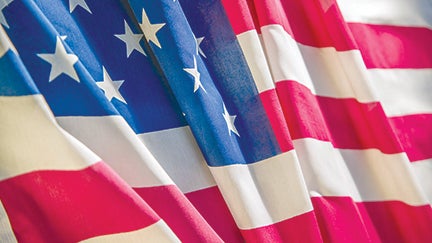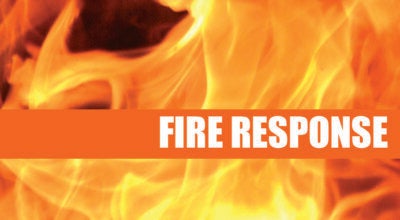Free speech keeps government in check
Published 10:50 pm Friday, January 19, 2018

- American flag banner
This is part of a series of stories about protections guaranteed by the First Amendment.
The United States is governed neither by a crown nor a single political ideology, and its legislative foundations are not underpinned by any need for imperial prestige or desire for social uniformity.
Instead, America is ruled by something much more basic — liberty.
The First Amendment guarantees five fundamental, indelible rights to all citizens, and the freedom to speak without fear of legislative reprisal is chief among those freedoms. The Bill of Rights states that congress is forbidden from passing any law that restricts an individual’s ability to speak without restraint.
Like all rights imbued by the Constitution, the freedom of speech is caught up in a cyclic tide of ongoing interpretation and evolution. The power to characterize and shape the First Amendment’s philosophical boundaries rests in the hands of the judiciary, and, with each progressive generation, civil liberties are subtly modified and redefined.
Whenever a question concerning the freedom of speech arises, the Supreme Court takes responsibility for settling any and all uncertainty. The court’s nine justices deliberate privately, and, once a consensus has been reached, the parameters of the First Amendment are expanded, diminished or held static.
That being said, the nation’s basic understanding of free speech has remained fixed for over 200 years. The First Amendment gives the American people the fundamental right to speak or not to speak, to use certain offensive words and phrases to convey political messages and to engage in symbolic speech.
The word “speech,” as interpreted by the Supreme Court, includes acts of physical self-expression.
Two popular examples of emblematic self-expression are the refusal to salute the flag or rise for The Star Spangled Banner. As Americans, we are not obliged to publicly acknowledge the state regalia. Instead, we are free to abstain from traditional displays of national pride and cachet.
When asked what he thought of the right to protest the national anthem, 19-year-old Brookhavenite Reese Reynaud said, “People have the freedom to do that. Do I think it’s right or should be done? No. But to each his own.”
Symbolic speech also includes acts of silent protest, like burning the American flag in objection to a declaration of war or holding an anti-government sign in a public park. Although sometimes incendiary, symbolic speech is well protected under the Constitution, because it affords the public an avenue through which to question the bounds of legislative authority.
However, the freedom of speech has its limitations. Generally, words or acts that cause direct or potential physical, emotional or financial harm to an individual or institution are not covered under the First Amendment.
For example, citizens do not have the right to libel, defame or slander one another. Nor does the freedom of speech allow someone to incite actions that could harm others, like shouting ‘fire’ in a crowded room.
Based on the 1942 Supreme Court case Chaplinsky vs. New Hampshire, 315 U.S. 568, ‘fighting words’ are also precluded from protection under the First Amendment. The Supreme Court defines ‘fighting words’ as remarks that “by their utterance, inflict injury or tend to incite an immediate breach of peace.”
The Brandenburg test is used to determine when the government may prohibit speech advocating the use of force or crime. If the objectionable speech satisfies both elements of the two-part test, then it can be deemed ‘fighting words.’
According to Cornell Law School, the Brandenburg test includes the following criteria:
• The speech is ‘directed to inciting or producing imminent lawless action.’
• The speech is ‘likely to incite or produce such action.’
Therefore, a person does not have the right to tell a torch-wielding mob, “Burn down the courthouse!” Such a provocation would fundamentally spur an act of public violence, thereby failing the Brandenburg test.
Like slander or fighting words, obscenity is also a category of self-expression not covered by the First Amendment, and all 50 states have individual laws controlling inappropriate material.
That being said, licentious materials or depictions — normally speech or physical expressions of an artistic nature — may be restricted in terms of time, place and manner, but are still protected by the First Amendment. For example, a sexually explicit portrait can hang without censure in a public museum, but the same picture would likely be considered inappropriate for public display outside of a museum.
The freedom of self-expression serves many important functions in the political landscape of the United States. It helps everyday people hold their government accountable, it gives individuals the ability to boldly express themselves and it protects the populace from undue, legislative reproach.
When Reynaud considers the freedom of speech, the first thing that comes to his mind is being able to say to somebody ‘God loves you.’
“And there’s nothing they can do about it,” he said.
Free speech has been responsible, in part, for the advancement of many important American social movements, like the early 20-century fight for universal suffrage and the civil rights crusades of the 1950s and ‘60s. And it continues to encourage modern, community reform across the country.
Benjamin Franklin once said, “Whoever would overthrow the liberty of a nation must begin by subduing the freeness of speech.”
As long as Americans continue to cherish their rights and rail against institutions that seek to limit public freedoms, the United States will go on standing as an unyielding bastion of civil liberty.





